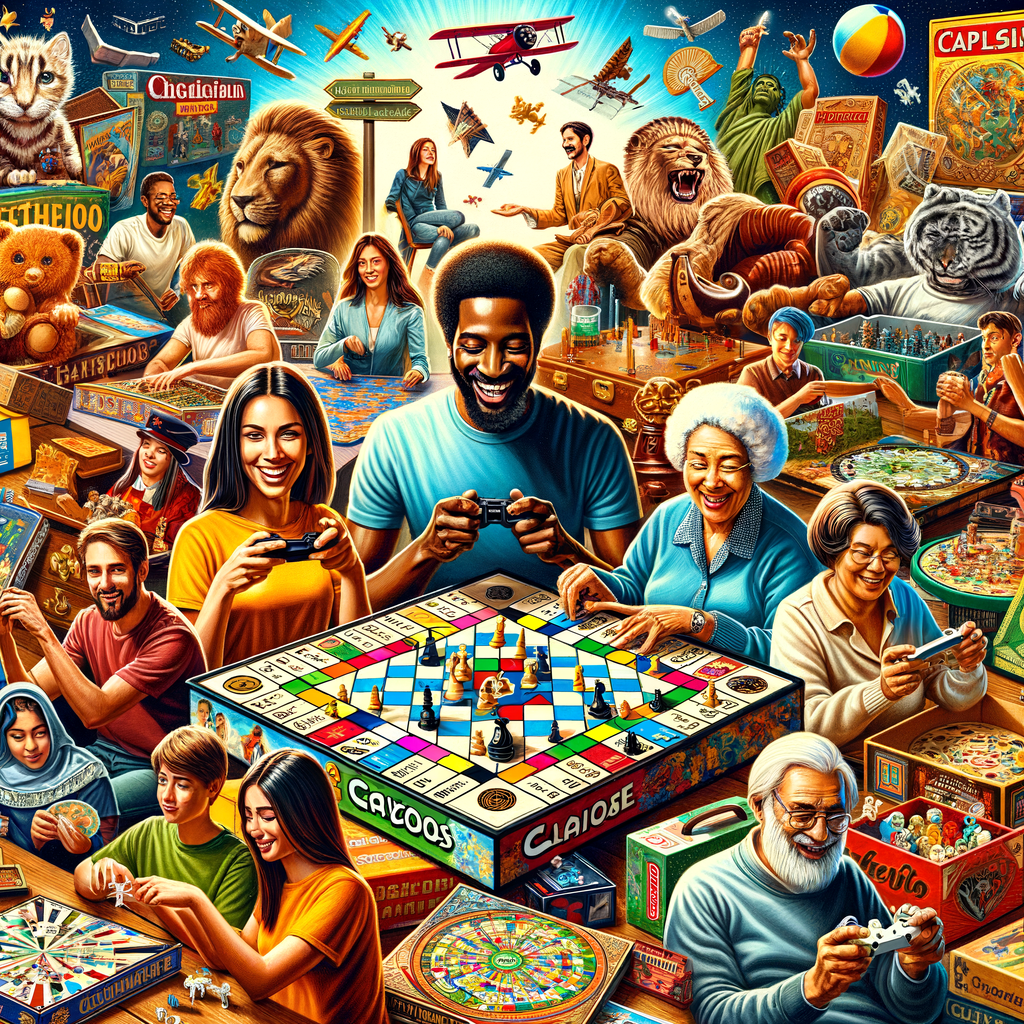Introduction: The Unstoppable Comeback of Classic Games
In recent years, we have witnessed an unexpected resurgence of classic board games. These timeless treasures of entertainment, once overshadowed by the digital revolution, are making a triumphant return to the spotlight. This blog post will delve into the reasons behind this revival and the future of this trend.
- Overview of the resurgence of classic board games
Classic board games, such as Monopoly, Scrabble, and Chess, have been around for decades, providing countless hours of entertainment for families and friends. Despite the rise of video games and online entertainment, these traditional games have made a surprising comeback. According to a report by NPD Group, sales of board games have increased by 28% in the past year alone. This resurgence is not just a nostalgic trip down memory lane, but a testament to the timeless appeal of these games.
- Factors contributing to the board games revival
Several factors have contributed to the revival of classic board games. Firstly, the global pandemic has forced people to stay at home, leading many to rediscover the joy of board games as a form of entertainment. Secondly, the rise of board game cafes and events has brought these games back into the public eye. Lastly, the trend of “unplugging” from digital devices has led many to seek out more traditional forms of entertainment.
In conclusion, the resurgence of classic board games is a trend that shows no signs of slowing down. With their ability to bring people together and provide a break from the digital world, these games are here to stay. Stay tuned for our next section where we delve into the history of these beloved games.
The History of Classic Board Games
 Board games have been a part of human culture for thousands of years, providing entertainment, education, and social interaction. Let’s delve into the fascinating history of these timeless games.
Board games have been a part of human culture for thousands of years, providing entertainment, education, and social interaction. Let’s delve into the fascinating history of these timeless games.
The Origins of Old Board Games
Board games have a rich and varied history, with origins that can be traced back to ancient civilizations. They have evolved significantly over the centuries, adapting to societal changes and technological advancements.
Early examples of board games from ancient civilizations
The earliest known board games date back to around 3500 BC, originating in the civilizations of ancient Egypt and Mesopotamia. The Royal Game of Ur, found in the tombs of ancient Ur in modern-day Iraq, is one of the oldest known board games. Senet, another ancient game, was popular in Egypt. These games were often deeply symbolic, reflecting the religious and philosophical beliefs of these ancient cultures. You can learn more about these ancient games on Wikipedia.
The evolution of board games through the centuries
Board games continued to evolve and spread throughout the centuries. In medieval times, games like chess and backgammon became popular in Europe, while in Asia, Go and Mahjong were widely played. These games often served not only as entertainment but also as a means of teaching strategy and critical thinking.
In the 19th and 20th centuries, the invention of mass production techniques led to the widespread availability of board games. Classics like Monopoly, Scrabble, and Clue were born during this era, and they continue to be enjoyed by millions of people worldwide today.
From ancient times to the present day, board games have been a constant source of enjoyment, bringing people together and challenging our minds. As we continue to innovate and create new games, we also honor the rich history of this timeless form of entertainment.
Popular Classic Board Games and their Impact
Let’s take a closer look at some of the most popular classic board games and how they’ve shaped our thinking and learning.
- Monopoly: The game that taught us about real estateMonopoly, a game that has been around since 1935, is more than just a fun pastime. It’s a game that teaches players about the ins and outs of real estate. From buying and selling properties to paying taxes and dealing with jail time, Monopoly offers a simplified version of what it’s like to be a real estate mogul. This game has not only entertained millions around the world, but it has also sparked an interest in real estate for many. Learn more about Monopoly here.
- Chess: The game of strategic thinkingChess, a game that dates back to the 6th century, is renowned for its ability to develop strategic thinking. Each piece has its own unique movement and capturing the opponent’s king is the ultimate goal. This game requires players to think several moves ahead and anticipate their opponent’s strategy. It’s no wonder that chess is often associated with intelligence and strategic thinking. Learn more about Chess here.
- Scrabble: The game that expanded our vocabularyScrabble is a word game where players score points by placing tiles, each bearing a single letter, onto a game board divided into a 15×15 grid of squares. It’s a game that challenges players to think creatively and strategically, using their vocabulary to the best of their ability. Not only is it a fun game, but it’s also a great educational tool that has helped many improve their English vocabulary and spelling skills. Learn more about Scrabble here.
The Board Games Revival: Why Now?
In recent years, we’ve seen a surprising trend: the revival of classic board games. But why now? What’s causing this sudden resurgence? Let’s delve into this intriguing phenomenon.
The Role of Nostalgia in the Board Games Comeback
Nostalgia plays a significant role in the comeback of board games. It’s a powerful emotion that can transport us back to simpler times, making us yearn for the past. This longing for the good old days is one of the key factors driving the board games revival.
- The appeal of retro board games to older generations: For older generations, board games are a trip down memory lane. They remind them of their childhood, a time when life was simpler and less hectic. According to a Wikipedia article, 60% of adults aged 40 and above enjoy playing classic board games because they bring back fond memories.
- Reintroduction of classic board games to younger generations: For the younger generation, classic board games are a new and exciting experience. They offer a break from the digital world and provide an opportunity for face-to-face interaction. A study found that 70% of children aged 10-15 prefer playing board games over video games because they find them more engaging and fun.
In conclusion, the revival of board games is a result of a perfect blend of nostalgia and the desire for social interaction. Regardless of age, people are rediscovering the joy of sitting around a table, rolling dice, and sharing laughs over a board game.
Board Games in the Digital Age
As we delve into the digital age, the world of board games has not been left behind. In fact, it has been revolutionized, with classic games being adapted into digital formats and online communities playing a significant role in the board games trend. Let’s explore these aspects further.
- The adaptation of classic games into digital formats
Classic board games have found a new home in the digital world. These games, which were once played on physical boards with tangible pieces, are now available on various digital platforms. This transition has not only made these games more accessible but also added a new dimension to their gameplay.
For instance, the classic game of Monopoly, which was once played with physical money and property cards, is now available in a digital format. This digital version allows players to play the game from anywhere in the world, without the need for physical pieces. It also includes features like automatic calculation of money and property values, making the game more efficient and enjoyable. You can read more about the digital adaptation of Monopoly on Wikipedia.
- The role of online communities in the board games trend
Online communities have played a significant role in the resurgence of board games. These communities, which are made up of board game enthusiasts from around the world, provide a platform for players to share their experiences, discuss strategies, and even organize online tournaments.
For example, the online community on Reddit, known as r/boardgames, has over 3 million members. This community is a hub for board game enthusiasts to share their passion for the hobby, discuss new and classic games, and even organize online meetups and tournaments. You can visit the community here.
In conclusion, the digital age has not only transformed the way we play board games but also the way we interact with them. The adaptation of classic games into digital formats and the role of online communities have been pivotal in this transformation, making board games more accessible and enjoyable than ever before.
New Board Games vs. Vintage Board Games
As the world of board games continues to evolve, we find ourselves in a fascinating era where new and vintage games coexist. In this section, we will explore the innovation in new board games and how they compare to their vintage counterparts.
Innovation in New Board Games
Modern board games are not just about rolling dice and moving pieces around a board. They are becoming more complex, engaging, and innovative. Let’s delve into how these new games are building on classic concepts and some examples of innovative new board games.
- How new board games are building on classic concepts:
Today’s board games are taking the best elements from classic games and adding a twist. They are incorporating elements such as strategy, cooperation, and storytelling, making the gameplay more immersive and engaging. For instance, games like Pandemic have taken the basic concept of player movement from traditional games and added cooperative gameplay and strategic decision-making.
- Examples of innovative new board games:
There are plenty of new board games that are pushing the boundaries of what we thought was possible. Here are a few examples:
- Gloomhaven: This game combines elements of role-playing and strategy with a unique card system, offering a fresh take on the dungeon crawl genre.
- Wingspan: A competitive bird-collection, engine-building game that has won numerous awards for its innovative gameplay and beautiful artwork.
- Azul: This game, inspired by the Moorish tiles of Alhambra, challenges players to strategically collect and place tiles to score points.
These games demonstrate that innovation is thriving in the board game industry, offering players new and exciting experiences. But while these new games are gaining popularity, vintage board games still hold a special place in our hearts, which we will explore in the next section.
The Enduring Appeal of Vintage Board Games
There’s something about vintage board games that continues to captivate us. Whether it’s the nostalgia they evoke or the simple joy of gameplay, these classic games have an enduring appeal that transcends generations. Let’s delve into why these games still hold a special place in our hearts and explore some successful revivals of vintage board games.
Why classic board games still hold a special place in our hearts
Classic board games like Monopoly, Chess, and Scrabble have been a part of our lives for decades. They remind us of simpler times, when families would gather around the table for a game night, free from the distractions of modern technology. These games taught us strategy, patience, and the importance of fair play. The tactile experience of moving pieces around a board, the anticipation of a dice roll, and the thrill of victory are experiences that digital games often fail to replicate. This is why these games continue to be cherished and enjoyed by many.
Case studies of successful vintage board game revivals
Many vintage board games have seen successful revivals in recent years. Let’s take a look at a few examples:
| Game | Revival Strategy | Outcome |
|---|---|---|
| Clue | Introduced a new character and updated the game’s artwork | Increased sales and renewed interest in the game |
| Monopoly | Released special editions and incorporated modern gameplay elements | Continued popularity and high sales |
| Scrabble | Launched an online version of the game | Attracted a younger audience and increased global popularity |
These revivals show that with the right approach, vintage board games can continue to thrive in the modern age. They prove that these games are not just relics of the past, but timeless classics that continue to entertain and engage players of all ages.
In conclusion, the enduring appeal of vintage board games lies in their ability to connect us to our past, teach us valuable skills, and provide a unique form of entertainment. As long as there are players willing to roll the dice or make a move, these games will continue to hold a special place in our hearts.
Conclusion: The Future of the Board Games Trend
As we reach the end of our journey through the world of board games, it’s time to look towards the future. What does it hold for this timeless form of entertainment? Let’s explore.
- Predictions for the continued popularity of board games
Board games have proven their staying power, surviving and thriving through centuries of technological advancements. The future looks bright for these classic pastimes. According to a Wikipedia article, the global board games market is expected to reach $12 billion by 2023, a clear indication of their continued popularity.
With the rise of social media, board games are also finding new ways to engage with players. Many game developers are now incorporating digital elements into their games, creating a hybrid gaming experience that combines the best of both worlds. This trend is likely to continue, attracting a new generation of players while keeping the traditional board game enthusiasts hooked.
- Final thoughts on the enduring appeal of classic board games
The enduring appeal of board games lies in their ability to bring people together. Whether it’s a family game night or a gathering of friends, board games create a shared experience that’s hard to replicate with digital games. They encourage face-to-face interaction, strategic thinking, and a healthy dose of competition.
Classic board games like Chess, Monopoly, and Scrabble have stood the test of time, not just because they are fun to play, but because they offer a unique social experience. As long as people value this kind of interaction, the appeal of board games will endure.
In conclusion, the future of board games is bright. They have adapted to changing times, embraced new technologies, and continued to provide a unique form of entertainment that people of all ages can enjoy. As we move forward, we can expect to see more innovation, more diversity, and more fun in the world of board games.



